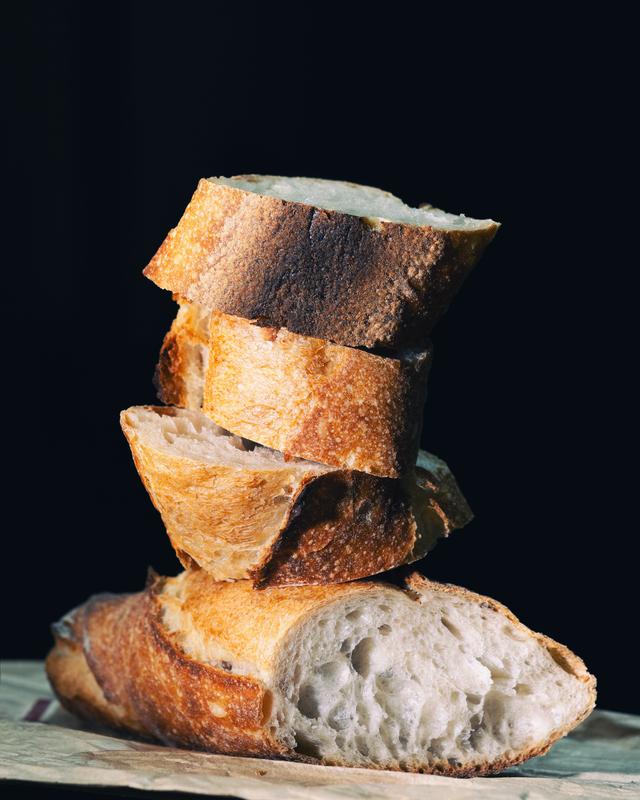Joshua Martin
Joshua Martin is a Best of Net finalist and Pushcart Prize nominee. A Donald Justice Scholar at the upcoming Sewanee Writers' Conference, Joshua's poems, essays, and reviews have been published in The Bitter Southerner, The Kenyon Review Online, Salamander, Nashville Review, Raleigh Review, Baltimore Review, Rattle, and elsewhere. His first book, Earth of Inedible Things, recently won the Jacar Press Full-Length Contest judged by Afaa Michael Weaver. He lives in Asheville with his lovely fiancé and two cat-children, Possum and Ichabod.
Why We Bake Bread
Because we know the yeasted music
of enzymes, how that single-celled god
rises a world from nothing.
Because even the un-risen are sacred:
the roti & naan & tortillas beaten
on sunbaked stones. Because we once died
in droves for want of wheat in Mesopotamia
— the onslaught of locusts blackening
the sky or a drought so deep we praised
the water in our palms. Because the Romans
believed Jupiter was a baker, chiseled god
of Pompeii’s carbonized loaves.
Because we’ve been looking at it all wrong:
wheat domesticated us with its Pavlovian bell
of plenitude and promise, germ and starch,
chaffs swaying for miles across a land golden with husks.
Because companion derives from the Latin
com, “with,” and panis, “bread,” they who arrive
with sourdough and place it in a blue bowl
on our counters. Because in Scandinavia,
tradition holds that if two people eat
from the same rye they will make love
over carraway seeds. Because Dali spent years
painting a loaf teetering on a table’s edge,
each dropped crumb a fascist casualty.
Because time was bread cost a million
marks in Germany. Because we’ve rioted
for it in streets wet with blood, stripped for it,
begged for it with our children bouncing
on our knees. Because we cut the crust off
of it with a sculptor’s precision. Because we remember
the way our grandfathers ate challah
until they died, how the salt on their lips
brought them back to 1939, to the smokestacks
of Pittsburgh, to the young baker on 34th street
whose fingers danced in flour until they were lopped off
on Guam. Because my grandfather told me how
after they buried him, after night broke
and the last grey bird was visible swooping
crazed above the Alleghany, after the hammers
stopped swinging at Ampco Steel
and the workers went home to forget the smell
of their lives, they grieved over a mountain of rolls.
Because he said he never forgot the whiff
those mornings his mind filled with river stench,
how that malty sweetness wafted from a window,
slowing his stride, making him believe
in things he could not name.
It’s the little barbecue joints I like
after Thomas Lux
with their rusted sidings and smoke
leaking into December
when there’s no comfort
but brisket brimming on the bone,
splatting against parking lots
in constellations of stains.
I like them in the South,
especially in towns named
for nuisances: Muskrat, Mississippi,
Tarantula, Tennessee,
towns carved from fatback
and cold cuts, from the knowledge
that death comes quick
when aromas slip from our lives.
Unincorporated and without
grievances, their patrons dream
of vinegar and pepper
flakes flaming tongues
with ambition.
Little bigger than shacks,
doors rawboned
and two more fights
from blowing off their hinges,
these spots are porcine
churches churning flavor
sermons beneath pink neon tubes.
And so I enter them
with reverence for the swine
and the bolt stunner’s speed,
for the music of cracklings
crumbling in parchment
and the holy water
of molasses, for even that
which I will not eat:
the maw and the cloved feet
and the offal that runs
through the mind
of the priest as they hunch
over this converted propane tank
that is so American
in its battered beauty,
in its urge
to bless this skin
by splitting it open.
©2021 West Trade Review
__________________________________________________________________________________________________________________________________________________________________________
__________________________________________________________________________________________________________________________________________________________________________
__________________________________________________________________________________________________________________________________________________________________________
__________________________________________________________________________________________________________________________________________________________________________
__________________________________________________________________________________________________________________________________________________________________________
Stay Connected to Our Literary Community. Subscribe to Our Newsletter



